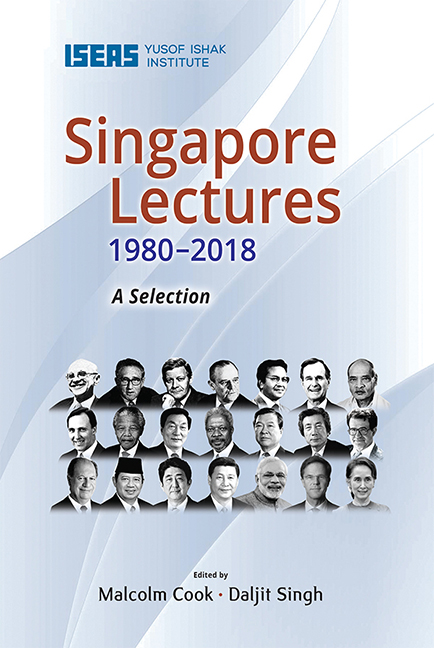Book contents
- Frontmatter
- Contents
- Introduction
- 1 The Invisible Hand in Economics and Politics
- 2 American Foreign Policy: A Global View
- 3 The Soviet Union: Challenges and Responses as Seen from the European Point of View
- 4 Trends in the International Financial System
- 5 Regionalism, Globalism and Spheres of Influence: ASEAN and the Challenge of Change into the 21st Century
- 6 US Policy in the Asia-Pacific Region: Meeting the Challenges of the Post-Cold War Era
- 7 India and the Asia-Pacific: Forging a New Relationship
- 8 Australia, Asia and the New Regionalism
- 9 South and Southern Africa into the Next Century
- 10 China and Asia in the New Century
- 11 Global Values: The United Nations and the Rule of Law in the 21st Century
- 12 Peace on the Korean Peninsula and East Asia
- 13 Japan and ASEAN in East Asia: A Sincere and Open Partnership
- 14 EU and Asia: Sharing Diversity in an Inter-regional Partnership
- 15 Global Challenges in the 21st Century: A View from Chile
- 16 Indonesia: The Challenge of Change
- 17 Japan and ASEAN, Always in Tandem: Towards a More Advantageous Win-Win Relationship through My “Three Arrows”
- 18 Forging a Strong Partnership to Enhance Prosperity of Asia
- 19 India’s Singapore Story
- 20 The Netherlands, Singapore, Our Regions, Our World: Connecting Our Common Future
- 21 Democratic Transition in Myanmar: Challenges and the Way Forward
- The Singapore Lecture Series
- The Editors
20 - The Netherlands, Singapore, Our Regions, Our World: Connecting Our Common Future
Published online by Cambridge University Press: 09 October 2021
- Frontmatter
- Contents
- Introduction
- 1 The Invisible Hand in Economics and Politics
- 2 American Foreign Policy: A Global View
- 3 The Soviet Union: Challenges and Responses as Seen from the European Point of View
- 4 Trends in the International Financial System
- 5 Regionalism, Globalism and Spheres of Influence: ASEAN and the Challenge of Change into the 21st Century
- 6 US Policy in the Asia-Pacific Region: Meeting the Challenges of the Post-Cold War Era
- 7 India and the Asia-Pacific: Forging a New Relationship
- 8 Australia, Asia and the New Regionalism
- 9 South and Southern Africa into the Next Century
- 10 China and Asia in the New Century
- 11 Global Values: The United Nations and the Rule of Law in the 21st Century
- 12 Peace on the Korean Peninsula and East Asia
- 13 Japan and ASEAN in East Asia: A Sincere and Open Partnership
- 14 EU and Asia: Sharing Diversity in an Inter-regional Partnership
- 15 Global Challenges in the 21st Century: A View from Chile
- 16 Indonesia: The Challenge of Change
- 17 Japan and ASEAN, Always in Tandem: Towards a More Advantageous Win-Win Relationship through My “Three Arrows”
- 18 Forging a Strong Partnership to Enhance Prosperity of Asia
- 19 India’s Singapore Story
- 20 The Netherlands, Singapore, Our Regions, Our World: Connecting Our Common Future
- 21 Democratic Transition in Myanmar: Challenges and the Way Forward
- The Singapore Lecture Series
- The Editors
Summary
Prime Minister Mark Rutte of the Netherlands delivered the 39th Singapore Lecture on 24 November 2016. He was introduced by Deputy Prime Minister and Coordinating Minister for Economic and Social Policies Tharman Shanmugaratnam. He was the third Netherlands Prime Minister to give a Singapore Lecture. His lecture is a robust defence of openness and free trade, especially for small countries like the Netherlands and Singapore, at a time when the forces of nationalism and populism were gaining ground in Europe and the United States of America.
Your Excellency Deputy Prime Minister Tharman Shanmugaratnam, Professor Wang Gungwu, Your Excellencies, ladies and gentlemen, students.
Thank you for giving me the opportunity to speak to you here today. I’d also like to thank my host, Prime Minister Lee, for inviting me to visit your country.
2015 was a notable year for Singapore. You celebrated fifty years of independence with a parade of 11,000 people, fireworks and 600,000 roses made from recycled plastic bags. For me, those roses are typical of Singapore. Both creative and responsible. Even on a public holiday, you uphold the principles of the circular economy.
On 23 March of the same year your country was plunged into mourning by the death of Lee Kuan Yew. He is greatly missed. In the words of his son and your prime minister Lee Hsien Loong, “To many Singaporeans, and indeed others too, Lee Kuan Yew was Singapore.”
Lee Kuan Yew's life ran parallel with Singapore's transformation from a colony to one of the best-performing countries in the world. He was the architect of the republic. In his memoirs he noted, “We had to create a new kind of economy. Try new methods and schemes never tried before anywhere else in the world, because there was no other country like Singapore.”
His vision and dedication helped turn Singapore into an economic superpower. With its low unemployment rate, high GDP, low levels of corruption, and wellmaintained public spaces, Singapore has rightly been described as “the little city that could” and “the envy of the world”.
So what is your secret? What makes us so jealous when we look at Singapore? I expect you know better than I do. But if I were to hazard a guess, I would say it's all down to education. Singaporeans make Singapore what it is, and this country invests in its people. You value your human capital. Thanks to ISEAS and other research and education institutions, Singapore is a world-class knowledge hub. Its universities are among the best in Asia and even the world. But it all starts with primary schools and teachers. And they too are among the world's best.
- Type
- Chapter
- Information
- Singapore Lectures 1980-2018 , pp. 280 - 291Publisher: ISEAS–Yusof Ishak InstitutePrint publication year: 2020



